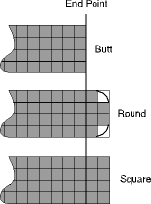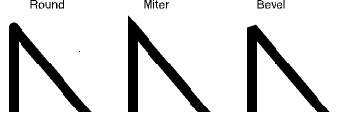

| SIMPLELINESYMBOL | Examples |
| <SIMPLELINESYMBOL |
Attribute Description Table
|
|
When using ArcMap Server: color ="0,0,0 - 255,255,255" [0,0,0] type ="solid" [solid] width ="0 - NNN" [0] When using Image or Feature Server: antialiasing ="true | false" [false] captype ="butt | round | square" [butt] color ="0,0,0 - 255,255,255" [0,0,0] jointype ="round | miter | bevel" [round] overlap ="true | false" [true] transparency ="0.0 - 1.0" [1.0] type ="solid | dash | dot | dash_dot | dash_dot_dot" [solid] width ="0 - NNN" [0] > No Child Elements </SIMPLELINESYMBOL > | |
| Attribute | Usage | Back to Top |
|---|---|---|
| antialiasing | 1 Used to make edges of labels and symbols smoother. When set to "true", antialiasing is active. Note that the time to generate a map may significantly increase when antialiasing is turned on. | |
| captype | 2 Line end style. |
|
| color | 3 Symbol color using RGB values. | |
| jointype | 4 Line join style. |
|
| overlap | 5 Determines if labels can overlap this symbol. When "true", labels can overlap. When "false", labels will not overlap the symbol. If labels are not drawing as expected, check if overlap is set to "false" for this symbol or any other symbol in the ArcIMS service. | |
| transparency | 6 Value to set percentage of transparency. 1.0 is 0 percent transparent. 0.0 is 100 percent transparent. | |
| type | 7 Line type. | |
| width | 8 Line width in pixels. | |
| Example 1: | Back to Top |
| <?xml version="1.0" encoding="UTF-8"?> <ARCXML version="1.1"> <CONFIG> <ENVIRONMENT> <LOCALE country="US" language="en" variant="" /> <UIFONT color="0,0,0" name="Arial" size="12" style="regular" /> <SCREEN dpi="96" /> </ENVIRONMENT> <MAP> <PROPERTIES> <ENVELOPE minx="-178.215027" miny="18.924782" maxx="-66.969849" maxy="71.406647" name="Initial_Extent" /> <MAPUNITS units="decimal_degrees" /> </PROPERTIES> <WORKSPACES> <SHAPEWORKSPACE name="shp_ws-0" directory="<path to USA ESRIDATA>"/> </WORKSPACES> <LAYER type="featureclass" name="ROADS" visible="true" id="1"> <DATASET name="ROADS" type="line" workspace="shp_ws-0" /> <SIMPLERENDERER> <SIMPLELINESYMBOL transparency="0.7" type="dash" width="1" color="127,227,27" antialiasing="false" overlap="true" captype="square" jointype="miter" /> </SIMPLERENDERER> </LAYER> </MAP> </CONFIG> </ARCXML> | |
| Example 2: Using three line symbols to create a complex line symbol. | Back to Top |
| <?xml version="1.0" encoding="UTF-8"?> <ARCXML version="1.1"> <CONFIG> <ENVIRONMENT> <LOCALE country="US" language="en" variant="" /> <UIFONT color="0,0,0" name="Arial" size="12" style="regular" /> <SCREEN dpi="96" /> </ENVIRONMENT> <MAP> <PROPERTIES> <ENVELOPE minx="-178.215027" miny="18.924782" maxx="-66.969849" maxy="71.406647" name="Initial_Extent" /> <MAPUNITS units="decimal_degrees" /> </PROPERTIES> <WORKSPACES> <SHAPEWORKSPACE name="shp_ws-0" directory="<path to USA ESRIDATA>"/> </WORKSPACES> <LAYER type="featureclass" name="ROADS" visible="true" id="2"> <DATASET name="ROADS" type="line" workspace="shp_ws-0" /> <GROUPRENDERER> <SIMPLERENDERER> <SIMPLELINESYMBOL transparency="1.0" type="solid" width="8" captype="round" jointype="round" color="0,0,0" /> </SIMPLERENDERER> <SIMPLERENDERER> <SIMPLELINESYMBOL transparency="1.0" type="solid" width="6" captype="round" jointype="round" color="255,0,0" /> </SIMPLERENDERER> <SIMPLERENDERER> <SIMPLELINESYMBOL transparency="1.0" type="solid" width="1" captype="round" jointype="round" color="255,255,255" /> </SIMPLERENDERER> </GROUPRENDERER> </LAYER> </MAP> </CONFIG> </ARCXML> | |